Thanks for your interest in our last two posts, the Best Books of 2015 Part One and the Best Books of 2015 Part Two. What a joy to get orders for these kinds of great books.
Putting together such lists is always a bit dicey for me — I forget books that I read earlier in the year and I wonder how I might honor titles that look so good and seem so impressive but that I haven’t really read yet. It’s a lot for me to manage during our store’s busy holiday season, and I know I miss some.
Of course we are completely sincere in awarding books and authors with our little accolades, but the point — I’m not at all ashamed to say this — is for you, dear reader, to buy them. From us. We are proud to get to be your bookseller yet another year and eager to get more good books into your hands. We’d like to think we curate a fairly interesting selection, books that might prove helpful to you. It’s like they say on those ubiquitous insurance commercials: it’s what we do.
And we think we have at least some idea of some itches of yours that need scratching. You can find best-sellers of all sorts all over, and faceless algorithms come up with some stuff, if you’re touched by that sort of thing. But we’re here working for you, telling you what we’ve got that you might like hearing about.
And so, here are a few that I sort of wanted to name last week. These are all good titles that came out in the tale end of 2015 but I haven’t had time to study. A few are quite new, actually, and I didn’t want to move into the new year too quickly without giving these a shout out. Fascinating, curious, well done, exceptionally thoughtful — the sorts of volumes Hearts & Minds loves telling you about.
All are available from us at 10% off, sent out with a smile and a prayer.
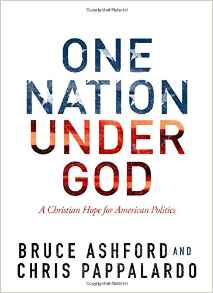 One Nation Under God: A Christian Hope for American Politics Bruce Ashford and Christ Pappalardo (B&H Academic) $14.99 Okay, I’ll admit two things: I am worried these days about those who too easily use this phrase, One Nation Under God. Americana wholesome as it is, it has been abused by civil religionists and hijacked by the too often unbiblical Christian right. I have suspicions of anyone thinking this should be a lead phrase on a book. Secondly, if I look through the footnotes in a book on faithful politics and don’t see it citing Jim Skillen (for instance, his must-read The Good of Politics or Ron Sider’s excellent Just Politics or the brilliant Political Visions and Illusions by David Koyzis) I wonder what books from what tradition has informed the writer. There’s so much bad stuff out there.
One Nation Under God: A Christian Hope for American Politics Bruce Ashford and Christ Pappalardo (B&H Academic) $14.99 Okay, I’ll admit two things: I am worried these days about those who too easily use this phrase, One Nation Under God. Americana wholesome as it is, it has been abused by civil religionists and hijacked by the too often unbiblical Christian right. I have suspicions of anyone thinking this should be a lead phrase on a book. Secondly, if I look through the footnotes in a book on faithful politics and don’t see it citing Jim Skillen (for instance, his must-read The Good of Politics or Ron Sider’s excellent Just Politics or the brilliant Political Visions and Illusions by David Koyzis) I wonder what books from what tradition has informed the writer. There’s so much bad stuff out there.
Well, my fears were mostly allayed, and this recent little book ends up being really, really great. I should have known — Bruce Riley Ashford did a great little compact volume called Every Square Inch: An Introduction to Cultural Engagement for Christians (yep, he’s a Kuyper guy, and has read deeply in the relationship of theology and culture and pondered Kuyper’s popular slogan about Christ redeeming every little bit of creation.) In fact, in One Nation Under God these two authors draw heavily on the teachings about “common grace for the common good” from Father Abraham (Kuyper), and they insist that politics is not an evil field to be avoided nor an avenue for Christians to take over culture in some bombastic power play. They are passionate about the gospel and about our citizenship. Their little manifesto attempts to “engage in politics responsibly, confidently, graciously — even Christianly.”
One Nation Under God is divided up into two succinct sections. The first part offers their principled view of the role of government, our calling as citizens — basically a reformationally-rooted view of Christian politics, inspired somewhat by Albert Wolters (Creation Regained.). You can hear overtones of folks as important as Wolters, Leslie Newbigin, and N.T. Wright in chapters with titles such as these:
Locating Politics Within the True Story of the Whole World
Choosing Between Four Competing Views of Public Life
Declaring the Gospel as Public Truth
Doing Politics in a Post-Christian Country
Cultivating Wisdom and Public Virtue
This is an amazing little volume; the first half — just 65 pages — draws on Abraham Kuyper and Martin Luther King, Jr., Al Wolters and James Davidson Hunter, Rich Mouw and Karl Barth. Those astute quotes alone makes it worth the price of the book.
The second half applies this vision of civic life to seven issues or areas of concern — sexuality and family, creation care, war and peace, immigration, poverty and economics, racial diversity and the like. As you might expect from a book endorsed by writers of First Things, co-written by a provost at Southeastern Baptist Theological Seminary, they are thoughtfully conservative on sexuality and life issues, but surprisingly passionate about fresh thinking (at least for most conservatives) on creation care and racial justice and immigration. I suppose this is as it should be: they are truly attempting to develop a Biblically-inspired, theologically conservative worldview out of which can come non-partisan, Christian political ideas and proposals. I would not come down exactly where they do on every policy question, but so what? This is designed to enhance our thinking, stimulate conversation, get us more carefully footed on the solid rock of Christ’s Kingdom, even as we ponder how to be salt and leaven and light in an obviously hurting, complicated and contested public square. Kudos.
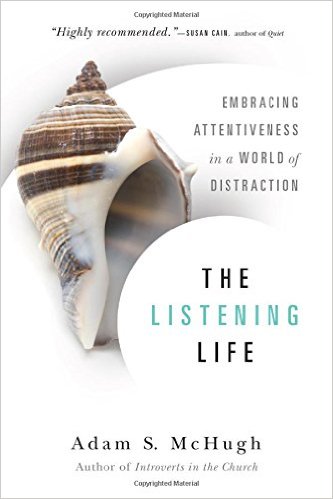 The Listening Life: Embracing Attentiveness in a World of Distraction Adam S. McHugh (IVP) $16.00 Just reading the table of contents of this splendid, beautiful book makes one feel invited into it; who doesn’t want to be a better listener? And who doesn’t want to — in the words of Frederick Buechner — “listen to your life”? This book is a bit contemplative, an invitation to slow down, a guide to attentiveness. What a gift!
The Listening Life: Embracing Attentiveness in a World of Distraction Adam S. McHugh (IVP) $16.00 Just reading the table of contents of this splendid, beautiful book makes one feel invited into it; who doesn’t want to be a better listener? And who doesn’t want to — in the words of Frederick Buechner — “listen to your life”? This book is a bit contemplative, an invitation to slow down, a guide to attentiveness. What a gift!
Mr. McHugh is an author you should know; his first book is the only one on the topic of introverts in the church and it is excellent. (It is called Introverts in the Church — some people have raved about it to us! Interestingly, this new one caught the attention of Susan Cain, author of the best seller The Quiet and she says this one is “highly recommended.” Pretty cool, huh?
McHugh here invites us to pay attention in a world of distraction, not just to the generic others in your life, but to specific voices: listening to God, listening to Scripture, listening to creation, listening to others, listening to people in pain, and listening to your own life. Wow.
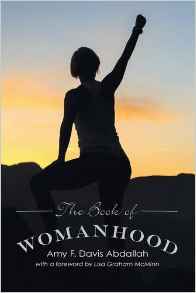 The Book of Womanhood Amy F. David Abdallah (Cascade) $25.00 I don’t know what the publisher was thinking with this blackened out shadow of a woman for the cover, but the cheap look shouldn’t dissuade you from checking out this fine, fine book. The author (a beloved professor of theology and Bible at Nyack College) is passionate about life, about guiding others into taking up their life’s journey with gusto, and with helping women students, especially, discover their own best identity.
The Book of Womanhood Amy F. David Abdallah (Cascade) $25.00 I don’t know what the publisher was thinking with this blackened out shadow of a woman for the cover, but the cheap look shouldn’t dissuade you from checking out this fine, fine book. The author (a beloved professor of theology and Bible at Nyack College) is passionate about life, about guiding others into taking up their life’s journey with gusto, and with helping women students, especially, discover their own best identity.
As one of Dr. Abdallah’s colleagues — the Director of Spiritual Formation at the college — puts it,
Amy has artfully constructed this rite of passage for women in order to help women understand and embrace what it means to be a woman and to celebrate the beautiful and delicate complexities that make us uniquely feminine. The Book of Womanhood is an outstanding resource for families, churches, and colleges.
Of course there are many debates within the evangelical world about God’s plan for women and men and what is meant by “Biblical womanhood.” This book can help “create a path through the confusion “by it’s flexible framework of finding identity through developing a relationship with God, self, and others, and creation.” This multi-faceted vision is fabulously realized, and it comes with a truly lovely foreword by the excellent writer from George Fox University, Lisa Graham McMinn. Nice!
Here is an fine endorsement from Mimi Haddad, the President of Christians for Biblical Equality:
Expected to be married with children in her twenties, life unfolded in unanticipated ways for Amy David Abdallah. These became opportunities to journey with God toward self-discovery and empowerment. This book builds wholeness in all its relationships. For these reasons, The Book of Womanhood is hard to put down.
So, there. It may be hard to pick up, but I’m telling you, it will be so, so useful, and I commend it to you if you are a young woman or care about any young women. Buy a bunch for a book group!

The backstory involved an internet post that went viral when Dolive, an ordained minister in the Christian Church (Disciples of Christ) decided to speak out when he saw a hyper-sexualized Victoria Secret’s ad campaign with undergarments in their PINK line — designed for Spring Break — with sexually suggestive words on them. Another mainline pastor, a clergy colleague of Rev. Dolive, got a ton of hits on a piece he had written exposing this lurid bit of profiteering aimed at young women, which captured the attention of Dolive. He investigated the lurid marketing efforts of Victoria’s Secret and, as a father of teenager girls, decided to draft an open letter to them. His piece, in turn, went viral, and he received quite a lot of attention from all over the world. When he ended up talking about sexism and and body image, marketing and sexuality, and being made in the image of God on CNN, there was a lot of attention. People.com named him one of the “top five coolest dads” and he decided to turn his missive into a larger book. Seeking Imperfection: Body Image, Marketing, and God is the result, and we should all be very, very grateful.
Delive reminds us of the need for the church to confront the destructive tendencies of hyper-sexualized marketing and to counter them by reminding us how we have been created in God’s image. This challenge — for the church to speak to the culture on this very matter — as Derek Penwell says in his review, “is a welcome word to a culture preoccupied with how people look.”
Unlike some books, this isn’t abstract theology exploring the meaning of the Imago Dei although it isn’t merely a screed against greedy marketeers. It is a very interesting, casual, if serious, exploration of our culture and the invitation for a sacred conversation. Since Dolive is a father and a pastor and a theologian, Seeking Imperfection is written with a tender heart, even if he is at times properly excised about how our society foists culture images of sexiness and self worth upon us all. There are good discussion questions and a few resources offered in the back. (Oh, how I wished he’d have cited Margot Starbuck’s excellent Unsqueezed: Springing Free from Skinny Jeans, Nose Jobs, Highlights and Stilettos (my favorite book on body image for women) and Sam Van Eman’s On Earth as It Is in Advertising? Moving from Commercial Hype to Gospel Hope, one of the few basic books on thinking Christianly about advertising and coping spiritually with its hype, written by a good friend.)
Yes, Dolive’s a cool dad, talking mostly with an eye to the issues of younger women, but his study has large implications.
Christian Piatt, a popular Disciples of Christ writer notes some of the bigger theological stuff this pastor of Family Life helps us to grapple with:
Can we be made in the image of God and still be imperfect? This conundrum has plagued contemporary Christianity for far too long. Dolive, in his new book, takes this toxic religious issue head-on, offering a much-needed alternative to the illusion of Christian perfection. Additionally, he reclaims the pursuit of accepting ourselves as we are, imperfections included, so we may first learn to love ourselves before taking on the audacious (but critical) command to love others likewise.
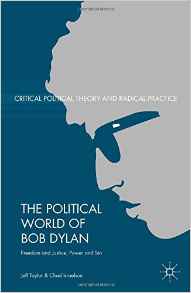 The Political World of Bob Dylan: Freedom and Justice, Power and Sin Jeff Taylor & Chad Israelson (Palgrave Macmillan) $105.00 Okay, I was going to be snarky and award this some caustic shout out for being obscenely over-priced. I protest the terrible overpricing of academic books and can’t believe that some publishers think they should get away with this nonsense. That said, get thee to a library (although few libraries these days can afford these costly volumes) or buckle down and save some dough so you can order this from us — it is nothing short of spectacular. It is a seriously Christian, profoundly insightful study of Dylan, seen by way of thinking about a non-aligned, counter-cultural bit of politics shaped by God’s Kingdom.
The Political World of Bob Dylan: Freedom and Justice, Power and Sin Jeff Taylor & Chad Israelson (Palgrave Macmillan) $105.00 Okay, I was going to be snarky and award this some caustic shout out for being obscenely over-priced. I protest the terrible overpricing of academic books and can’t believe that some publishers think they should get away with this nonsense. That said, get thee to a library (although few libraries these days can afford these costly volumes) or buckle down and save some dough so you can order this from us — it is nothing short of spectacular. It is a seriously Christian, profoundly insightful study of Dylan, seen by way of thinking about a non-aligned, counter-cultural bit of politics shaped by God’s Kingdom.
Part of the Palgrave “Critical Political Theory and Radical Practice ” series, these authors bring a surprising perspective. Jeff Taylor is a bit of a friend, a Professor of Political Science at Dordt College, the seriously Dutch Reformed/Kuyperian college in Iowa, and have some important influences in common. In any event, this is the definitive book on the politics of Dylan, and should be on the shelf of any serious collector of books about Mr. Zimmerman and his work.
As it says on the back, The Political World of Bob Dylan “comprehensively investigates Dylan’s relationship to the social, political, and religious cultures that acted upon him and to which he reacted. Generally associated with the New Left politics of the 1960s, Dylan’s political worldview transcends that narrow description. The ideas he has expressed in songs and interviews can be categorized as traditional, populist, and Christian anarchistic.” Yeah, man, you read that right.
Colman McCarthy — who some will remember for his remarkable work teaching inner city high school kids about nonviolence and peacemaking — says, “As ably as any writers who have probed Dylan’s politics, Taylor and Israelson clarify the complexities and explain the subtleties.”
I loved this quote by Dylan fan, sociologist and Baptist preacher, Tony Campolo,
After reading this book, I had the feeling that Jeff Taylor and Chad Israelson understand Dylan better than Dylan understands Dylan. They made me aware that I had made Bob Dylan in my own political image, and that he is much more complex than that.
If you read much about the inscrutable Mr. Dylan and his wondrous oeuvre, you may know the book Song of the North Country by a Minnesota university prof, David Pichaske. He writes
In their extensively researched, engagingly written, and carefully argued examination of Dylan’s thought and art, Taylor and Israelson both extend and shed new light on previous Dylan scholarship.
Just so you know, the authors have become friends with Nat Hentoff, the legendary rock critic who knows Dylan so well and he has offered exceptional support. And how many mainstream scholarly books of this calibre, in these circles, thank Wendell Berry, Bill Kauffman, and Cal Seerveld for assistance? The book is unconscionably pricey, but the content is maybe priceless.
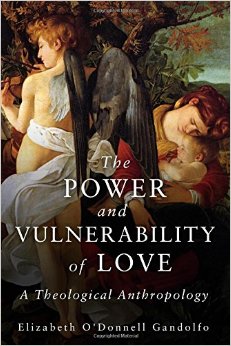 The Power and Vulnerability of Love: A Theological Anthropology Elizabeth O’Donnell Gandolfo (Fortress) $39.00 I’m not going to lie — we have so many books on a Christian view of the human person that I just wasn’t interested in another academic anthropology. But then I read the fascinating review in The Christian Century by one of my favorite book reviewers, Lauren Winner. In that review, Winner caught my attention with her opening line, “If Jurgen Moltmann and Brene Brown collaborated on a book, what might emerge is something like The Power of Vulnerability of Love.“
The Power and Vulnerability of Love: A Theological Anthropology Elizabeth O’Donnell Gandolfo (Fortress) $39.00 I’m not going to lie — we have so many books on a Christian view of the human person that I just wasn’t interested in another academic anthropology. But then I read the fascinating review in The Christian Century by one of my favorite book reviewers, Lauren Winner. In that review, Winner caught my attention with her opening line, “If Jurgen Moltmann and Brene Brown collaborated on a book, what might emerge is something like The Power of Vulnerability of Love.“
All rightee then.
As Lauren explains in her smart review, Gondolfo explores the notion of God’s empathy, solidarity, vulnerability — to use older language, she is asking if God is impassable? That is, does God change as God suffers with us? When God comes near us in the human Jesus, does that mean God has risked vulnerability? It is hard to not want to answer yes, from our limited understanding, it is obvious God has risked much. The God of the Bible, despite what some majestic hymns intone, is not a distant deity that is utterly fixed. And, of course, we limited, suffering humans are made in the image of God. So, Winner writes,
Perhaps this is true of all theological anthropologies: in order to say something insightful about the kinds of creatures human beings are, one must say something about who God is, and because God is more interesting than we are, the theologians claims about divinity will always be the most arresting part of the project.
Here is what Elizabeth O’Donnell Gandolfo does in her new book: she explores the nature of humans, and the nature of God, by way of reflecting up and reporting beautifully about the vulnerability of mothers, especially in the act of childbirth. Lauren Winner’s review continues,
Gandolfo doesn’t need doctrine about God to say any of that; she just needs feminist sociology. But her descriptions of maternity yield a way to say something about God. The theology she limns is aptly paradoxical.
That is, is seems that The Power and Vulnerability of Love both affirms God’s great risk, willing to be vulnerability, and yet affirms — unlike the tendency of most mainline denominational scholars these days — that, really, we don’t most need a God who is present, accompanying us in our grief and loss and limits, but we need a Someone who will not be buffeted by the horrors. In Winner’s words, Gondolfo suggests that “Were this not the case, the image of God within us could be eradicated. It cannot. It is inviolable precisely because the God it images is invulnerable.”
Well, I have not explored this big book, although I am interested in Gondolfo’s study of the character of God (“and how an infinite and invulnerable God can be said to have wholly entered into human existence”) and of her study of the human person. Maybe like me, you will be particularly interested in her study of motherhood, childbirth, midwifes, babies, and the like.
Listen to Bonnie J. Miller-Mclemore, who writes,
It’s so refreshing to read a work that takes vulnerability so seriously… This changes everything (to see how, you need to read the book.) Most impressively Gandolfo could not know what she knows without direct encounters with mothering, including other mother’ narratives and practices. I love how she weaves maternal knowledge and Christian sources into a conceptually rich portrait of what it means to be human.
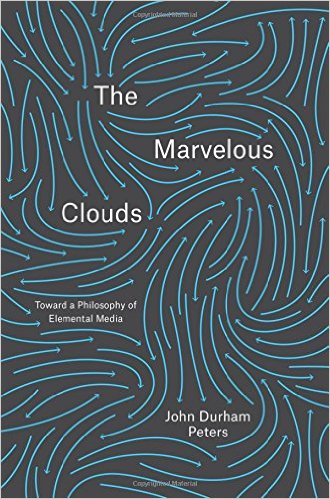 The Marvelous Clouds: Toward a Philosophy of Elemental Media John Durham Peters (University of Chicago Press) $30.00 Oh how I wanted to list this somehow as one of the most significant books of last year. It has been touted as “highly original” and “more than foundational.” One reviewer says it is “dazzlingly intelligent.” I just hadn’t worked with it at all — it is a well-made, sturdy hardback from one of the world’s most prestigious publishing houses, but — as these things go — I have no idea what the authors views are, his assumptions and values, his backstory or worldview. It sure seems so very interesting — I was immediately drawn to the wordplay of the title. I’m glad for anyone who find meaning in nature, and relates human culture to the realities of God’s good world, whether they call it that or not.
The Marvelous Clouds: Toward a Philosophy of Elemental Media John Durham Peters (University of Chicago Press) $30.00 Oh how I wanted to list this somehow as one of the most significant books of last year. It has been touted as “highly original” and “more than foundational.” One reviewer says it is “dazzlingly intelligent.” I just hadn’t worked with it at all — it is a well-made, sturdy hardback from one of the world’s most prestigious publishing houses, but — as these things go — I have no idea what the authors views are, his assumptions and values, his backstory or worldview. It sure seems so very interesting — I was immediately drawn to the wordplay of the title. I’m glad for anyone who find meaning in nature, and relates human culture to the realities of God’s good world, whether they call it that or not.
Just read these two blurbs from the back cover:
“This book is about media in the way that Moby-Dick is about whaling. When Melville set the Pequod sailing between heaven and earth, he turned the ship into a lens through which his readers could examine humankind’s place in the cosmos. In The Marvelous Clouds, Peters turns water, land, fire, and sky into lenses through which readers can explore the role of mediation in every aspect of their lives. This is a completely original, wildly ambitious, and deliciously lyrical book. It will certainly change the way you see media. It might also change the way you see the world.”
Fred Turner, author of The Democratic Surround: Multimedia and American Liberalism from World War II to the Psychedelic Sixties
“Wide-ranging, playful, erudite, and delightfully diverse, The Marvelous Clouds redefines media in the largest possible terms, as anything that communicates meaning, including bodies, the environment, and the world itself. Although this may seem to rob media of its specificity and therefore of its theoretical purchase, in Peters’s hands it becomes the occasion for making surprising and insightful connections. A treat for academics and general readers alike, this is a book not to be missed.”
N. Katherine Hayles, author of How We Think: Digital Media and Contemporary Technogenesis
Just so you know, there is another blurb that goes on and on about the author’s familiarity with the obtuse continental philosopher Martin Heidegger and that “his epistemological realism overcomes the conventional position of the ‘linguistic turn’ and of ‘constructivism’ with a fresh and truly inspired unfolding of intuitions…” Just saying.
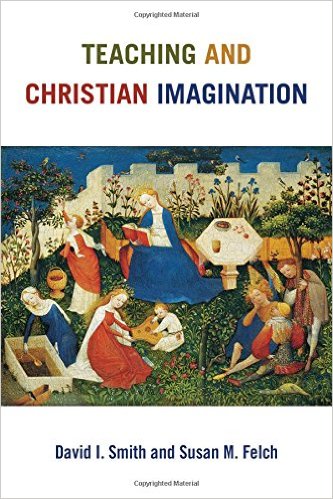 Teaching and Christian Imagination edited by David I. Smith and Susan M. Felch (Eerdmans) $22.00 This book came in December but it is dated 2016. I think it was the first 2016 release we got in our store, so our hats are off to Eerdmans and these fine scholars at Calvin College. Smith is the director of the Kuyers Institute for Christian Teaching and Learning (and the director of the graduate program in education at Calvin) and Felch is the director of the Calvin Center for Christian Scholarship which has offered the world some very good books over the last decades. She is also a professor of English and has written some lovely works herself.
Teaching and Christian Imagination edited by David I. Smith and Susan M. Felch (Eerdmans) $22.00 This book came in December but it is dated 2016. I think it was the first 2016 release we got in our store, so our hats are off to Eerdmans and these fine scholars at Calvin College. Smith is the director of the Kuyers Institute for Christian Teaching and Learning (and the director of the graduate program in education at Calvin) and Felch is the director of the Calvin Center for Christian Scholarship which has offered the world some very good books over the last decades. She is also a professor of English and has written some lovely works herself.
As I spent time with this I was struck, as I knew I would be, by their deep Christian convictions, but how this pushes us onward to think about new stuff, working with new images and metaphors in helpful ways. Yes, yes, we need basic books that explain conventional Christian theology as it shapes our assumptions and worldview and how that relates to each and every academic discipline or professional career. And this does this, but they “tell it slant” and invite us not just to “integrate Christ convictions and teaching” but they explore an energizing vision of the very art of teaching. That is they “encourage teacher-readers to reanimate their work by imagining it differently.”
And how does one do this, re-imagine teaching? Well, they unpack three metaphors for teaching, namely journeys and pilgrimage, gardening and experience in wilderness, and buildings and walls. As Karen Eifler writes of it, “the authors provide catalysts for teachers of any discipline in religious institutions to rethink, reignite, and recommit to their vocation. Wending my way through this text I found myself invited and equipped to cultivate a hermeneutic wonder…”
There are some splendid essays here, well worth pondering, that bear fruit with repeated readings, I’m sure. Authors include Barbara Carvill, Kurt Schaefer, Timothy Steele, and John Witvliet and they all use these three metaphors to illuminate fresh visions of faith-infused teaching and learning.
Listen to some of what Dorothy Bass has said about this:
Imagine this, teachers, and experience it through reading this book: Set aside, for a moment, the fast pace and quantitative judgments that shape so much of contemporary education. Encounter biblical texts, poems, and works of art that help you to see what you do every day with new eyes. Hear down-to-earth stories from other teachers. Let your imagination of what it means to teach and to learn deepen and expand. Find renewal in the indispensable, beautiful, and difficult vocation to which God has called you.
Or, how’s this for a good endorsement, from Baylor University’s Perry Glanzer:
I have never read anything quite like this delightful book. The authors both nourish your soul and draw you along the path toward teaching excellence…. Every kind of Christian teacher will find this book life-giving.
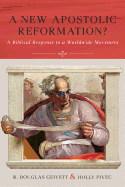 A New Apostolic Reformation? A Biblical Response to a Worldwide Movement R. Douglas Geivett & Holly Pivec (Weaver Book Company) $19.99 I wasn’t sure if many of our friends or followers would care about this, but it is so very interesting, and the authors so respected — both are involved at the Talbot School of Theology at Biola — that we wanted it to be known, and let you know that we stock it. Even if you’ve never heard of this NAR movement of the last decade or so, it’s good to know about what’s going on in certain wings of the Body of Christ.(Geivett, by the way, wrote the fascinating IVP book called Faith, Film, and Philosophy which explored worldviews and philosophical topics in contemporary film, so is adept at discerning what’s going on out there.) This recent book, as Dr. James Spiegel (a philosophy and religion prof at Taylor University) says, “is an important book, a one-stop shop for an explanation and biblical assessment of the so-called New Apostolic Reformation.”
A New Apostolic Reformation? A Biblical Response to a Worldwide Movement R. Douglas Geivett & Holly Pivec (Weaver Book Company) $19.99 I wasn’t sure if many of our friends or followers would care about this, but it is so very interesting, and the authors so respected — both are involved at the Talbot School of Theology at Biola — that we wanted it to be known, and let you know that we stock it. Even if you’ve never heard of this NAR movement of the last decade or so, it’s good to know about what’s going on in certain wings of the Body of Christ.(Geivett, by the way, wrote the fascinating IVP book called Faith, Film, and Philosophy which explored worldviews and philosophical topics in contemporary film, so is adept at discerning what’s going on out there.) This recent book, as Dr. James Spiegel (a philosophy and religion prof at Taylor University) says, “is an important book, a one-stop shop for an explanation and biblical assessment of the so-called New Apostolic Reformation.”
I don’t know if you know much about this new global movement, but it has a few main players — evangelicals who have become neo-Pentecostals, some new charismatics (although, interestingly, not exactly the Assembly of God folks, conventional Pentecostals here in the states.) A few of the names are nearly rock stars in some circles.
Somewhat gathered around the fascinating work of C. Peter Wagner, it blends some curious stuff about spiritual warfare, territorial spirits and a critique of Western/secular/modernist rejection of the supernatural — Wagner has been savvy about worldviews and cultures as a leader for 60 years in world-wide mission work.) Other names that a big in this big movement include Bill Hamon, Chuck Pierce, Che Ahn, and those involved the International Coalition of Apostolic Leaders.
A New Apostolic Reformation? A Biblical Response is a serious study, not a sensational expose. It looks at what the Bible teaches about prophets, false prophets, apostles and other offices of leadership. It looks at the nuances of views within various denominational traditions — from Roman Catholic to traditional Protestant to historic Pentecostal, right up to this new, raging movement about anointing new apostles.
This is not a general study opposing charismatic renewal or even mostly a study of the oddities of the NAR movement, but a theological reflection on what we should think about these sorts of movements and the doctrine of apostleship. It is meticulously footnoted and worthy of careful study.
As the winsome NT scholar Craig Keener (formerly of Eastern/Palmer but now a professor at Asbury Theological Seminary) notes, there are serious Biblical errors and sociological abuses lurking around some in this movement. He wisely recommends this book to help us be aware of and challenge some of the weirdness. Keener writes:
This critique invites all of us, wherever we stand on the spectrum, and whether we agree with every detail of [their] criticism, to recognize and challenge these errors. Serious errors exposed here include Manifested Sons doctrine, dominionism, extra-biblical ‘inspired’ doctrines, that exalt individuals, inappropriate fixation on esoteric information about evil spirits, and certain ‘apostles’ calling people out of other denominations or movements to submit to their covering.
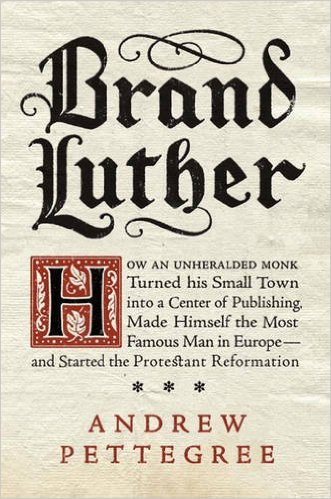 Brand Luther Andrew Pettegree (Penguin Press) $29.95 This fabulous looking, hefty hardback — the embossed printing gives you a feel that it was done on an old printing press — has gotten some great reviews since it came out late this fall. I like the big subtitle on the cover: How an Unheralded Monk Turned His Small Town into a Center of Publishing, Made Himself the Most Famous man in Europe — and Started the Protestant Reformation.
Brand Luther Andrew Pettegree (Penguin Press) $29.95 This fabulous looking, hefty hardback — the embossed printing gives you a feel that it was done on an old printing press — has gotten some great reviews since it came out late this fall. I like the big subtitle on the cover: How an Unheralded Monk Turned His Small Town into a Center of Publishing, Made Himself the Most Famous man in Europe — and Started the Protestant Reformation.
In a way, this is a good study of Luther and the rise of the Protestant reformation — just in time for the 500th anniversary here this year! But what makes it so curiously interesting is that it the author is an expert in — get this — the sixteenth century book business. As one scholar said, Brand Luther tells two tales. The first is an engaging biography of Martin Luther. The second is a stimulating account of the first time the printing press helped shape a mass movement.”
The reviews and back cover endorsements, by the way, are all of notable scholarly pedigree. Big, big book author Diarmaid Maccullouch has nice words, as do four or five mainstream historians and authors of books about the reformation era. For instance, Bruce Gordon of Yale Divinity School calls it “authoritative and beautifully written” and says that “Pettegree’s book provides a radical take on a revolutionary figure.” Karin Maag, professor of history and director of the H. Henry Meeter Center for Calvin Studies at Calvin College calls it “perceptive and engaging” concluding that,
Pettegree’s lucid and persuasive account offers an unparalleled insight into this outstanding early modern example of effective use of communication techniques that allows Luther’s message to take hold.
BookNotes
DISCOUNT
ANY ITEM MENTIONED
10% off
order here
takes you to the secure Hearts & Minds order form page
just tell us what you want
inquire here
if you have questions or need more information
just ask us what you want to know
Hearts & Minds 234 East Main Street Dallastown, PA 17313 717-246-3333
